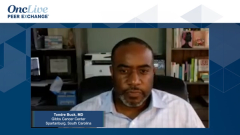
Multiple Myeloma: Disparities in Time to Diagnosis
Panelists address how racial and ethnic minority groups experience disparity in time to diagnosis within the multiple myeloma treatment pathway.
Episodes in this series

Transcript:
Joseph Mikhael, MD: Let's move then into thinking about some of these now evident disparities. We've tried to think about the why. There's the biological phenomenon, there's the societal phenomenon which we're just hitting the top of the iceberg here, right? There's no way we could dive into each of these topics in detail. But let's think about 5 or 6 of these going through. Let's start with the time to diagnosis. This is maybe my soap box and so I'm going to kick this one off and see if anyone wants to make a comment. There's a brilliant paper just published this last year that demonstrated that the average myeloma patient, independent of background and race, goes to their primary care physician three times with signs and symptoms that are consistent with myeloma before the diagnosis is made. Now, I don't say it to disparage my primary care friends. Listen, you come to my clinic you think everybody with back pain has myeloma, but I know that the average family doctor sees 300 back pains a month and could be that none of the 300 have myeloma. I don't say that to be critical but what I'm seeing is there is a time lag between literally everyone who has signs and symptoms of myeloma before the diagnosis is made. Occasionally we do pick up patients earlier because of a high protein or something and I think Irene's work is going to be sentinel for us in the future to realize that we must look, right? If you don't take a temperature, the patient doesn't have a fever. There is that delay, but sadly what we've seen is within the African American community. The delay is even longer. Whether it's insurance to be able to get the bone marrow test to make the definitive diagnosis but also there's much more to it and a lot of it has to do what you beautifully said, Craig, was confounding diagnoses like diabetes in particular where people are told oh that little bit of protein urea, oh that little bit of anemia, oh that little bit of neuropathy, oh that little bit of renal insufficiency, that's just your diabetes speaking. And they don't think of going down the path of myeloma. This time from symptom onset to diagnosis we want to fix that in every patient with myeloma. We want people to be attuned to it early on. But it helps us to realize that there is a greater disparity within this community and we have to start asking ourselves why. And I've just given a couple of suggestions but maybe someone else can chime in more. I've suggested that some of it may be confounding diagnoses. Some of it may be lack of access to the system that primary care doctors aren't as attuned to the issue. Let me just open it up if anyone else wants to make a comment about the time to diagnosis. Sikander?
Sikander Ailawadhi, MD: One thing that Craig said it's constantly in my mind right now is when Craig you mentioned that if a patient who is African American walks in with back pain or renal dysfunction maybe it becomes obvious to us that hey I must check ACM Protein Electrophoresis or light chain. What I'm thinking in the back of my mind is it's almost like anybody who's got a chest pain we don't say hey you've got heartburn just go take your Maalox and live with it, we act upon it. It's almost like we should be thinking about this high-risk group where a simple symptom cannot be discounted as something else and may make us look deeper. It makes perfect sense if we think in those terms that are certain diagnoses where you can't just go half-heartedly. You got to go all the way. But I think Joe, as you mentioned, about presentations, confounding factors, etc. we talk a lot about awareness, right? Awareness in patients, awareness in communities that are efforts through primarily Black churches or colleges, etc. And that's just like you said, Irene's work is going to be so phenomenal because we start connecting some of these dots that hey if somebody is African American or Hispanic and they have a diagnosis of myeloma well it's important for them to learn, their caregivers to learn. It becomes a part of the family history. We already know that anybody who has myeloma in the immediate family the incidents of MGUS is higher. And one thing that Irene was mentioning about the younger age, the younger age of diagnosis both MGUS and myeloma. Another important thing to keep in mind there is that yes so far, we think that MGUS does not increase true myeloma at a higher rate in African Americans, but MGUS does progress to myeloma at a younger age in African Americans. Being aware of these diagnoses, spreading that word, and trying to penetrate those areas is extremely important. But somehow not leaving certain diagnoses and going all the way with them, it was quite just saying that it was quite striking that this thing that Craig mentioned about. We know that kidney dysfunction, need for dialysis, anemia, hypercalcemia, increased calcium, they're all seen at a significantly higher rate in African Americans at the time of their initial diagnosis with myeloma.
Joseph Mikhael, MD: That's a great summary at the end there. In this section, although I love that you're jumping to part of the solution to raise awareness, you've highlighted so well there are so many reasons for that lag. The confounding diagnosis, the different presentation, the younger presentation. Those are all, I think, critical features as we think through it.
Transcript edited for clarity.












































